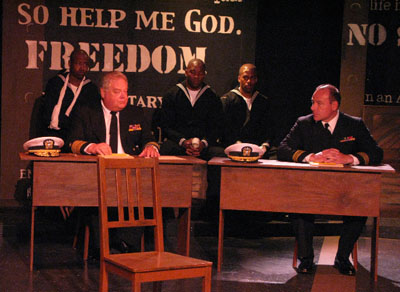|
By Cynthia Citron
 SANTA MONICA, California— SANTA MONICA, California—
All the ugly racist clichés about African-Americans that used to be tossed around with impunity during the Second World War are present in Paul Leaf’s new play Mutiny at Port Chicago, now having its world premiere at Santa Monica’s Ruskin Theatre. There’s even a slur about a “little Jew-boy lawyer” thrown in for free.
The most unfortunate part of this highly dramatic so-called “mutiny” is that it’s a true story. It took place in July 1944 at a military installation 50 miles from San Francisco, where African-American sailors had been assigned to load highly volatile ammunition into the holds of ships bound for the Pacific war zone.
Working round-the-clock, with no preliminary training, and egged on by white lieutenants who callously gambled on whose crew could load the most tonnage each day, the black sailors were well aware that they were, literally, “playing with fire.” And the “fire” came on July 17th, when 4600 tons of explosives blew up, destroying two ships and their crews and the nearby town of Port Chicago, leaving 320 dead and 390 seriously injured.
The white seamen at the facility were immediately given 30 days’ compassionate leave. The blacks were assigned to gathering the body parts of their friends who had been killed in the explosion.
It was ironic that African-Americans, who were not allowed to have weapons of any kind at that time, were charged with responsibility for handling thousands of tons of explosives in conditions that they themselves recognized as negligently dangerous. And so, when they were ordered back to their loading duties, they stood as one and refused the order.
Some 258 sailors were sent summarily to jail, charged with mutiny. Threatened with a firing squad, but offered leniency (which was never given), some 208 returned to work. But the 50 who refused were brought to trial, indicted for treason in time of war.
Presiding over “the biggest court martial in the history of the Navy,” the Admiral’s chief concern was who had put these sailors up to the “mutiny,” since, as he said, “They could not do this on their own.”
Seaman Edward Little (J. Teddy Garces), spoke eloquently for his comrades when he noted that “we volunteered to fight for
Go to top of right column
| |

our country, not to be stevedores,” and demanded “the right to die proud.”
Carl Coughlan as the bigoted Admiral and Chris D’Annunzio and Maury Sterling as the prosecuting and defense attorneys, respectively, were especially good, but the show was carried by the four seamen who represented the 50 defendants in the actual trial.
They were, in addition to Garces, Eric Bivens-Bush, Pedro Coiscou, and Durant Fowler.
While the play itself is devoid of action, it does have a stirring trial, taken from the actual Navy records of that time. Given the events that have taken place since then, it is hard to believe that only 60 years ago such arbitrary bigotry was accepted, and that actions were judged in such “black and white” terms (pun intended).
Powerful but preachy, the play is directed by the playwright, and its cast of 10 moves through it with either self-righteous indignation or dignity, depending on which side they’re on. Christina Silvoso’s set design consists of a series of walls with snatches of patriotic phrases emblazoned on them, effective but a little intrusive.
Like all the plays presented by the Ruskin Group, this one is worth seeing. But if you’re too young to remember the civil rights movement, you need a heavy “suspension of disbelief” to accept the fact that before that time the kinds of language, attitudes and behavior depicted in this play were not only routine, but taken for granted throughout this country.
Mutiny at Port Chicago will run Fridays and Saturdays at 8 p.m. and Sundays at 2 through August 15th at the Ruskin Group Theatre, 3000 Airport Road in Santa Monica. Call (310) 397-3244 for tickets.
|

